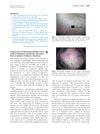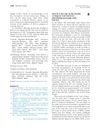Search
for
Sort by
Research
300-330 / 1000+ resultsresearch Serum Paroxonase 1 Level May Be an Indicator and Predictor of the Severity of Androgenetic Alopecia
Low PON1 levels may indicate and predict the severity of hair loss.

research Is Trichoscopy a Reliable Tool to Diagnose Early Female Pattern Hair Loss?
Trichoscopy effectively diagnoses early female hair loss, but may need scalp biopsy for confirmation.

research Trichoscopy of Dissecting Cellulitis of the Scalp: Exclamation Mark Hairs and White Dots as Markers of Disease Chronicity
Exclamation mark hairs suggest early scalp disease, while white dots indicate it's chronic.

research Alopecia Areata: A Review
Alopecia areata is an autoimmune hair loss condition treated with corticosteroids, and histologic confirmation is the best diagnosis method.

research Systematic Approach to Hair Loss in Women
A systematic approach is crucial for managing hair loss in women.

research Towards a Consensus on How to Diagnose and Quantify Female Pattern Hair Loss – The Female Pattern Hair Loss Severity Index (FPHL-SI)
New method measures female hair loss: Female Pattern Hair Loss Severity Index (FPHL-SI).

research Eyebrow and Eyelash Alopecia: A Clinical Review
The review shows how to properly diagnose and treat the loss of eyebrow and eyelash hair.

research Aftermath of COVID-19 Through the Eyes of Trichoscopy
COVID-19 can cause significant hair loss.

research Clinical Study on the Efficacy and Tolerability of an Oral Supplement Based on Arginine, L-Cystine, Zinc and B6 Vitamin (Cystiphane) in Patients With Telogen Effluvium
The oral supplement improved hair loss in patients with telogen effluvium.

research Prevalence of Hair Loss After COVID-19 Vaccination Among an Egyptian Population: A Cross-Sectional Study
About a quarter of the participants experienced hair loss after COVID-19 vaccination.

research Hair Disorders Associated With Post-Covid-19 Infection in Females: A Cross-Sectional Study
About 61% of women who had COVID-19 experienced hair loss afterward.

research SALT II: A New Take on the Severity of Alopecia Tool for Determining Percentage Scalp Hair Loss
The updated SALT II tool offers a more precise way to measure scalp hair loss.

research Telogen Effluvium: A Review of Acute and Chronic Forms
Chronic Telogen Effluvium may resolve after years and is diagnosed by examining the patient's history and clinical signs, with treatment aimed at underlying causes and possibly minoxidil.

research Hair Disorders in Patients with Cancer
Cancer treatments often cause hair disorders, significantly affecting patients' quality of life, and better management methods are needed.

research The Female Pattern Hair Loss: Review of Etiopathogenesis and Diagnosis
Female pattern hair loss involves hormonal factors, genetics, and may be linked to low ferritin levels.

research Vitamin D Receptor Gene Polymorphism in Chronic Telogen Effluvium: A Case-Control Study
Certain gene variations in the Vitamin D receptor may increase the risk of chronic hair loss.

research Role of Scalp Health in Achieving Optimal Hair Growth and Retention
Healthy scalp leads to better hair quality and less damage.

research Impact of Photobiomodulation on the Quality of Life of Men and Women With Androgenetic Alopecia
Photobiomodulation improves the quality of life for people with hair loss.

research Hair Restoration Surgery: Pre-Surgical Considerations And Pitfalls
Careful planning and accurate diagnosis are crucial for successful hair restoration surgery.

research Central Centrifugal Cicatricial Alopecia: Unraveling the Complexities of a Scarring Hair Disorder
CCCA is a scarring hair disorder mainly affecting people of African descent, needing better awareness and treatment.

research Review on Alopecia Areata in the Middle East and Africa: Landscape and Unmet Needs
The Middle East and Africa need better data, treatment consensus, and support for Alopecia Areata.

research Impact and Management of Loss of Eyebrows and Eyelashes
The document concludes that identifying the cause of eyebrow and eyelash loss is key to treating it and improving quality of life.

research Developing Optical Biometrics Using Optical Coherence Tomography for Medical Screening and Diagnosis
OCT can effectively screen and diagnose various medical conditions non-invasively.

research Androgenetic Alopecia in Women
Female hair loss is often hereditary and can be treated with medication, hair transplants, and lasers.

research Topical Dutasteride with Microneedling in Treatment of Male Androgenetic Alopecia
Combining topical dutasteride with microneedling is more effective for hair growth than microneedling alone.

research Platelet-Rich Plasma Efficacy in Alopecia Areata Patients With Normal and Elevated Levels of Antibodies Against Thyroglobulin and Thyroid Peroxidase
Platelet-rich plasma treatment is effective for hair loss in patients regardless of their thyroid antibody levels.

research Patient Satisfaction and Quality of Life Among Adult Women with Androgenetic Alopecia Using 5% Topical Minoxidil
Most women with hair loss using 5% topical Minoxidil are satisfied with the treatment, but hair loss still affects their daily habits and social life.

research Management of Telogen Effluvium During the COVID-19 Emergency: Psychological Implications
Quarantine stress likely worsened hair loss in women, but video consultations helped manage their condition and reduce anxiety.

research The Burden of Alopecia Areata: A Scoping Review Focusing on Quality of Life, Mental Health, and Work Productivity
Alopecia areata greatly affects people's life quality, mental health, and work life.